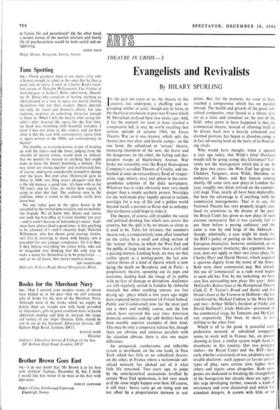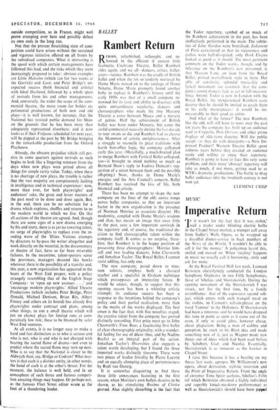Evangelists and Revivalists
THEATRE IN CRISIS —3
By HILARY SPURLING
Ithe past ten years or so, the theatre in this 'country has undergone a shuffling and re- • grouping similar in scale, though not in form, to the theatrical revolution in post-war France which M Abirached analysed here two weeks ago. And, if for the moment we seem to have reached a comparative lull, it may be worth recalling that curious episode of autumn 1964, the Great Theatre War as it was known, which split the theatre into two clear and hostile camps : on the one hand, the subsidised or 'serious' theatre, menacing champion of the new, the brave and the dangerous; on the other, the failing and des- pondent troops of Shaftesbury Avenue. War broke out ostensibly over the Royal Shakespeare Company's so-called Theatre of Cruelty, and un- leashed at once an extraordinary flood of vituper- ation, rage, misery, envy and spleen in the corre- spondence columns of the daily newspapers. Whatever was at stake obviously went very much deeper than a simple aesthetic protest. Nostalgia for the 'well-made play' rapidly spread to include nostalgia for a way of life and a golden world beyond recall, a passion so fierce and so unhappy that no theatre could hope to slake it.
The theatre, of course, still straddles the social and political dividing line which cuts across this country, but the split is by no means as clean as it used to be. Take, for instance, this autumn's theatre row, a comparatively tame affair launched on the critics by a small and ailing section of the 'serious' theatre, in which the West End and the public at large took no more than a civil and a passing interest. Looking back, we may see that earlier spasm as a turning-point, the last con- vulsive throes of a kind of theatre which is now dying the death on Broadway and in Paris : a propitiatory theatre, spooning out its paps and nostrums, feeding back the image of its public with no fear of damage or disruption. Audiences are still regularly served in London by imbecilic musicals but other soothing sources are fast drying up : plays which a few years ago might have expected better treatment (A Friend Indeed, Public and Confidential) now for the most part run a short and wobbly course, and the few which have survived this year (two American domestic comedies and the odd thriller) have all been notably superior examples of their kind. This may be only a temporary release but, though there are obvious and ominous parallels with the situation abroaa, there is also one major difference.
An antiquated, cumbersome and inflexible system is moribund, on the one hand, in New York which has little or no subsidised. theatre; on the other, in France where a nationwide sub- sidised network has choked out of it what little life remained. Two years ago, to judge by the semi-hysterical accusations levelled by certain West End spokesmen, it felt very much as if the same might happen over here. Of course, it still may : heavy costs go on rising and are not offset by a proportionate increase in seat prices. But, for the moment, we seem to have reached a compromise which has no parallel abroad. The health and growth of the great sub- sidised companies, once feared as a threat, now act as a tonic and stimulant on the rest of the field : what seems to have happened is that the commercial theatre, instead of allowing itself to be driven back into a heavily armoured and doomed position, has begun to abandon camp, is in fact advancing hard on the heels of its flourish- ing rivals.
Who would have thought, when it opened a year ago today, that Wilde's Ideal Husband would still be going strong this Christmas? Cer- tainly not the management which put it on. In the past two years, the West End has given us Chekhov, Turgenev, more Wilde, Sheridan, an embarras of Shaw, and Ben Jonson coming shortly. Of some sixty new plays in London this year, roughly two thirds arrived on the commer- :cial stage. True, nearly all have been deplorable; but here the advantage is, if anything, with the commercial managements. That is to say, the National Theatre has very properly largely con- fined its attentions to the drama of the past; the Royal Court has given us new plays of such ,extreme immaturity that it was scarcely fair to put them before a paying audience; and the same is true by and large of the Aldwych- though, admittedly, a case might be made for the RST's policy of putting on the better-known European dramatists, however untalented, as an insurance against insularity; this argument, how- ever, does not apply to their two latest plays, by Charles Dyer and David Mercer, which acquired a spurious dignity from the name of the house. Both were sheer commercial pap. But already this use of 'commercial' as a rude word begins to seem old hat. For, by my reckoning, we have seen five outstanding new plays this year : John McGrath's Bofors Gun at the Hampstead Theatre Club, C. P. Taylor's Bread and Butter and Joe Orton's Loot at the Traverse in Holborn—the last transferred by Michael Codron to the West End; and two—Arthur Miller's Incident at Vichy and David Halliwell's Little Malcolm—presented on the commercial stage, by Tennants and Mr Cod- ron respectively. The boot, in short, is fast shifting to the other foot.
Which is all to the good. A powerful com- prehensive network of subsidised companies seems to work well in France, but, on present showing at least, a similar system might have its drawbacks in this country. Our two principal outlets—the Royal Court and the RST—have each, whether consciously or not, adopted a recog- nisable platform: each appears to favour certain -types• of play, rates certain aims higher than others and rejects some altogether. Both com- panies are dedicated to breaking the stranglehold of the bourgeoisie but already there are signs of this urge developing further, towards a kind of missionary and even dictatorial zeal which has attendant dangers. A system with little or no
outside competition, as in France, might well prove cramping over here and possibly defeat its own ends in the long run.
Not that the present flourishing state of com- petition could have arisen without the sustained and vigorous initiative offered on all fronts by the subsidised companies. What is interesting is the speed with which certain managements have followed this lead, and the risks which they seem increasingly prepared to take: obvious examples are Little Malcolm (which ran for two weeks at the Garrick) and Loot; and Peter Bridge's un- expected success (both financial and artistic) with Ideal Husband, followed by a whole spate of revivals from his and other managements. And, conversely, the wider the scope of the com- mercial theatre, the more room for bolder ex- perimental productions of both new and old plays—it is well known, for instance, that the National has resisted public demand for Shaw on the grounds that he has been more than adequately represented elsewhere; and it now looks as if their Volpone, scheduled for next year, will be pipped at the post by Mr Bridge bringing in the remarkable production from the Oxford Playhouse.
Already, the obscure prejudice which still per- sists in some quarters against revivals as such begins to look like a lingering remnant from the days when new plays were prized above all things for simple rarity value. Today, when there is no shortage of new plays, the trouble is rather that the vast majority are conspicuously lacking in intelligence and in technical experience: now, more than ever, for both playwrights' and audiences' sake, the great and lesser masters of the past need to be done and done again. But, in the end, there can be no substitute for a drama which explores, shuffles and returns to us the modern world in which we live. On this all sections of the theatre are agreed. And, though there are some signs of a new drama emerging by fits and starts, there is as yet no towering talent, no surge of playwrights to replace even the re- ceding wave of the 'fifties. Various attempts by directors to by-pass the writer altogether and work directly on the material, in the documentary or theatre of fact, have so far been miserable failures. In the meantime, talent-spotters scour the provinces, managers descend like hawks wherever there is the possibility of a transfer and, this year, a new organisation has appeared in the heart of the West End proper, with a policy strangely resembling that of the English Stage Company: to 'open up new avenues . . .' and `encourage modern playwrights.' Allied Theatre Productions (which includes Peter Bridge, Peter Donald, Michael Denison, Brian Rix, Albert Finney and others on its board) has already five playwrights under contract and plans, among other things, to run a small theatre which will put on chancy plays for limited runs at com- paratively low risk; these to be financed by safer West End ventures.
At all events, it is no longer easy to make a hard and fast distinction as to who is serious and who is not, who is and who is not charged with bearing the sacred flame of drama—not even to predict where the sacred flame may turn up next. Who is to say that the National is closer to the Aldwych than, say, Bridge or Codron? What mat- ters is that each is a distinct entity, in other words, the hand of each is at the other's throat. For the moment, the balance is well held, and in an atmosphere of such fierce and furious competi- tion amazing things may happen. Or perhaps not, as the famous Fleet Street editor wrote at the foot of a thundering leader.































 Previous page
Previous page